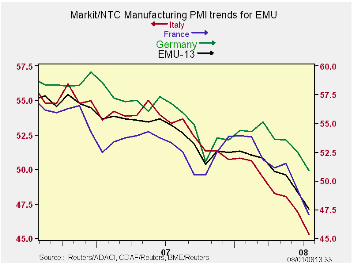 Global| Aug 01 2008
Global| Aug 01 2008Manufacturing PMIs: Falling in Concert in Europe
Summary
The Markit/NTC PMIs show a clear pattern of weakness in the manufacturing sector. Among the major PMI reporters only Germany and Greece still post PMI values above 50, the ostensible neutral mark. If we calculate where the various [...]

The Markit/NTC PMIs show a clear pattern of weakness in the manufacturing sector. Among the major PMI reporters only Germany and Greece still post PMI values above 50, the ostensible neutral mark. If we calculate where the various PMIs stand in their respective historic ranges we find that only Germany is above its range midpoint. Spain, Ireland and the UK are on all time lows since this measure has been reported going back to March 2000. We use March 2000 since it is the date from which all the above PMIs are available although some individual country reports go back farther. We want to compare them over a common time horizon.
On this basis most of the PMIs for manufacturing are in the lower third of their range or weaker. The EMU measure has slid to the lower third of its range. Europe’s manufacturing sector continues to erode.
| Markit/NTC Manufacturing Indexes | ||||||||
|---|---|---|---|---|---|---|---|---|
| Jul-08 | Jun-08 | May-08 | 3Mo | 6Mo | 12Mo | Percentile | ||
| Euro-13 | 47.38 | 49.16 | 50.60 | 49.05 | 50.38 | 51.62 | 27.0% | |
| Germany | 50.90 | 52.56 | 53.57 | 52.34 | 53.35 | 53.69 | 50.8% | |
| France | 47.05 | 49.24 | 51.48 | 49.26 | 50.76 | 51.54 | 22.6% | |
| Italy | 45.32 | 46.91 | 48.05 | 46.76 | 48.10 | 49.90 | 13.9% | |
| Spain | 39.20 | 40.61 | 43.79 | 41.20 | 43.66 | 47.04 | 0.0% | |
| Austria | 46.97 | 48.39 | 49.76 | 48.37 | 50.12 | 52.14 | 23.5% | |
| Greece | 51.63 | 53.81 | 53.77 | 53.07 | 53.11 | 53.31 | 42.3% | |
| Ireland | 43.39 | 44.71 | 45.21 | 44.44 | 45.63 | 48.58 | 0.0% | |
| Netherlands | 47.99 | 51.07 | 51.46 | 50.17 | 51.17 | 53.14 | 31.8% | |
| EU | ||||||||
| UK | 44.26 | 45.92 | 49.23 | 46.47 | 48.54 | 51.06 | 0.0% | |
Robert Brusca
AuthorMore in Author Profile »Robert A. Brusca is Chief Economist of Fact and Opinion Economics, a consulting firm he founded in Manhattan. He has been an economist on Wall Street for over 25 years. He has visited central banking and large institutional clients in over 30 countries in his career as an economist. Mr. Brusca was a Divisional Research Chief at the Federal Reserve Bank of NY (Chief of the International Financial markets Division), a Fed Watcher at Irving Trust and Chief Economist at Nikko Securities International. He is widely quoted and appears in various media. Mr. Brusca holds an MA and Ph.D. in economics from Michigan State University and a BA in Economics from the University of Michigan. His research pursues his strong interests in non aligned policy economics as well as international economics. FAO Economics’ research targets investors to assist them in making better investment decisions in stocks, bonds and in a variety of international assets. The company does not manage money and has no conflicts in giving economic advice.
More Economy in Brief
 Global| Feb 05 2026
Global| Feb 05 2026Charts of the Week: Balanced Policy, Resilient Data and AI Narratives
by:Andrew Cates






